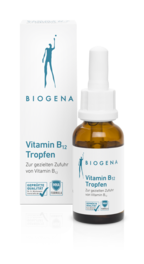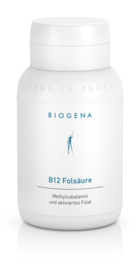Vitamin B12 is a real all-rounder – it can do much more than just support your nervous system! Especially if you are vegan or vegetarian, you should know how to get enough B12. We will show you how to optimally cover your vitamin B12 requirements and explain its versatile effects!
What is vitamin B12?
Vitamin B12, also known as cobalamin, is essential for many vital functions in your body. It supports your nervous system, ensures the formation of red blood cells and plays a key role in cell division. Because of its strong colour, it is also called the ‘red vitamin’. However, your body cannot produce it itself, so you must obtain it through your diet or supplements.
Vitamin B12 benefits: what is vitamin B12 good for?
Without enough vitamin B12, your body would produce fewer red blood cells, which can lead to anaemia, causing symptoms such as numbness, tingling and muscle weakness. But B12 can do even more! It supports cell division and ensures that your central nervous system runs smoothly. Long-term B12 deficiency can lead to depression, confusion and impaired brain function.
Together with other nutrients, B12 also helps to keep your homocysteine levels in balance to support your cardiovascular health.
If you are deficient in B12, your body may have difficulty providing enough energy, which can lead to fatigue, exhaustion and concentration problems. B12 also helps the body detoxify harmful substances.
Vitamin B12 foods: the best sources
Vitamin B12 is found almost exclusively in animal-based foods such as meat, fish, eggs and dairy products. If you follow a vegan or vegetarian diet, you may quickly become deficient in this vitamin, as it is virtually absent from plant-based foods. It is therefore important to ensure you have an adequate supply to prevent vitamin B12 deficiency!
Offal is particularly rich in vitamin B12, with duck meat and various types of liver being among the best sources. Seafood such as oysters, mussels and fatty fish such as herring and mackerel also provide significant amounts. Among meat types, rabbit, wild boar and lamb also contribute to the supply. Among dairy products, strong cheeses such as Emmental, Camembert and Gouda stand out, while eggs and fermented milk products such as yoghurt can also contribute.
You can find detailed information in the vitamin B12-rich foods table in the appendix.
Plant-based sources of vitamin B12
Plant-based foods with vitamin B12? They exist – but only in tiny amounts! Fermented products such as sauerkraut or beer and unwashed root vegetables may contain traces of it. Sounds good? Unfortunately, there's a catch: these are often so-called B12 analogues, which your body cannot utilise — and which can even block the absorption of real vitamin B12. That's why it's important to rely on reliable sources of B12!
B12 vitamin supplements
In order for our body to utilise vitamin B12, it must first be released from food. It then binds to a special protein, the intrinsic factor, which is produced in the stomach lining. Only then can vitamin B12 be actively absorbed in the small intestine.
The good news is that in higher doses, e.g. through supplements (vitamin B12 tablets, capsules or drops), the body can also absorb vitamin B12 passively through the intestinal mucosa.
Vitamin B12 dosage: How much per day?
Fortunately, our bodies don't need much vitamin B12 – according to the German Nutrition Society (DGE), 4 µg per day is enough to maintain balance. However, there is one exception: during pregnancy and breastfeeding, the requirement increases to 4.5 and 5.5 µg per day, respectively. Conveniently, our bodies even have B12 stores and can accumulate reserves – in the best case up to 4 g, which is a thousand times the daily requirement! But be careful: a prolonged deficiency can gradually deplete these stores.
Vitamin B12 intake: When should you take vitamin B12?
To improve absorption, it is helpful to take vitamin B12 on an empty stomach or between meals.
B12 levels & blood count – how can I recognise a deficiency?
When you have your vitamin B12 status checked, the total vitamin B12 in your blood is usually measured. This sounds reasonable, but there is a catch: this value often only indicates a deficiency at a late stage. This means that even if it is normal, your supply may already be critical.
Better? The holotranscobalamin value (Holo-TC) – also known as ‘active B12’. It provides early indications of a negative B12 balance and empty stores. Methylmalonic acid (MMA) in the blood or urine is also a good indicator: if it is elevated, your body may already be suffering from B12 deficiency. So if you want to be sure, it's worth keeping an eye on these values!
Vitamin B12 & folic acid: better together
Vitamin B12 and folic acid are real team players! They work hand in hand in metabolism and play an important role in homocysteine metabolism and blood formation*. But that's not all – these two B vitamins also support normal mental function and ensure that we stay mentally fit.
* Vitamin B12 plays an important role in normal red blood cell formation; folic acid contributes to normal blood formation.
Conclusion: Vitamin B12 is essential for many important bodily functions! Vegans, vegetarians, pregnant women, breastfeeding mothers, older people and those with gastrointestinal problems should pay particular attention to their intake. Regular B12 checks and targeted supplementation – through diet or supplements – will help you prevent deficiencies and keep your body fit!
Frequently asked questions about vitamin B12:
Cobalamin is another word for vitamin B12 – an essential vitamin that your body needs for many important processes. It plays a central role in blood formation, nerve function and energy metabolism.
Most vitamin B12 is found in animal-based foods such as meat, offal, fish and dairy products.
You can meet your daily vitamin B12 requirement through animal-based foods (e.g. liver, fish, eggs, dairy products) or dietary supplements.
Vitamin B12 plays a key role in the formation of red blood cells, energy metabolism, cell division and the functioning of the central nervous system. It also helps to regulate homocysteine levels and supports the detoxification of harmful substances.
Fruits and vegetables do not contain vitamin B12, at least not in significant amounts.
Vitamin B12 is best absorbed on an empty stomach or between meals.
Foodstuffs |
Vitamin B12 content |
|
Duck meat |
68,4 μg |
|
Veal liver |
54,1 μg |
|
Lamb’s liver |
47,7 μg |
|
Pork liver |
34,8 μg |
|
Oysters |
13,8 μg |
|
Liver sausage |
13,5 μg |
|
Mussels |
8,0 μg |
|
Rabbit meat |
8,7 μg |
|
Herring, smoked |
7,5 μg |
|
Mackerel, smoked |
7,3 μg |
|
Trout, cooked |
5,5 μg |
|
Tuna, cooked |
4,5 μg |
|
Wild boar meat |
4,4 μg |
|
Salmon, smoked |
3,5 μg |
|
Emmental cheese |
3,1 μg |
|
Camembert |
2,8 μg |
|
Lamb |
2,6 μg |
|
Beef |
2,3 μg |
|
Edam |
2,1 μg |
|
Gouda |
2,1 μg |
|
Chicken egg |
1,9 μg |
|
Pork |
1,8 μg |
|
Veal |
1,4 μg |
|
Mozzarella |
1,3 μg |
|
Yogurt |
0,4 μg |
|
Cow's milk |
0,4 μg |
Sources and references
Studies
Langen RC, Goodbred AJ. 2017. Vitamin B12 Deficiency: Recognition and Management. Am Fam Physician. 2017 Sep 15;96(6):384-389.
Rizzo G et al. 2016. Vitamin B12 Among Vegetarians: Status, Assessment and Supplementation. Nutrients. 2016 Nov 29;8(12):767.
Obeid R et al. 2019. Vitamin B12 Intake From Animal Foods, Biomarkers, and Health Aspects. Front Nutr. 2019 Jun 28;6:93.
Schüpbach R et al. Micronutrient Status and Intake in Omnivores, Vegetarians and Vegans in Switzerland. Eur J Nutr. 2017 Feb;56(1):283-293.
Gallego-Narbón A et al. Vitamin B 12 and Folate Status in Spanish Lacto-Ovo Vegetarians and Vegans. J Nutr Sci. 2019 Feb 26;8:e7.
Selinger E et al. Vitamin B12 Deficiency Is Prevalent Among Czech Vegans Who Do Not Use Vitamin B12 Supplements. Nutrients.2019 Dec 10;11(12):3019.
Watanabe F, Bito T. 2018. Vitamin B12 Sources and Microbial Interaction. Exp Biol Med (Maywood). 2018; Jan;243(2):148-158.
Websites
https://www.ganzimmun.de/diagnostik/leistungsverzeichnis
https://www.aerzteblatt.de/archiv/61696/Ursachen-und-fruehzeitige-Diagnostik-von-Vitamin-B12-Mangel
https://www.quarks.de/gesundheit/ernaehrung/vitamin-b12-und-vegane-ernaehrung
https://fet-ev.eu/vegane-ernaehrung
https://www.vitaminb12.de/algen
https://www.vegan.at/vitaminb12









